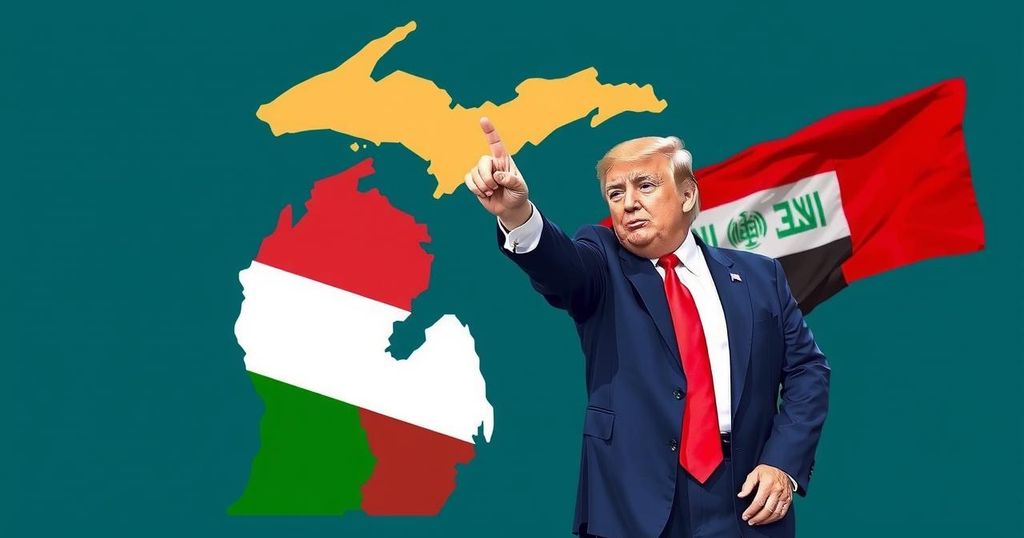Growing Support for Trump Among Arab Voters in Michigan Ahead of Election
In Michigan, growing support for Donald Trump is noted among Arab American voters, largely due to their discontent with the Democratic Party’s handling of Middle Eastern policies linked to Israel’s military actions. Activists claim the party has taken their support for granted, fueling a strategic pivot towards Trump, who is seen as a potential agent for change. Local leaders’ endorsements and community sentiments reflect a significant shift in voting patterns that could influence electoral outcomes in the state’s critical swing counties.
The support of Arab American voters for Donald Trump is rising significantly ahead of the upcoming United States election, primarily driven by dissatisfaction with the Democratic establishment, particularly Vice President Kamala Harris, linked to the ongoing conflicts in Gaza and Lebanon. Activists in the Arab American community, such as Samraa Luqman, explicitly attribute this shift to the Biden administration’s unwavering support for Israel during its military actions, which they perceive as genocidal. Luqman articulated that should Harris experience electoral defeat, it would be a direct consequence of the Democratic Party taking the Arab vote for granted. Amid this political reorientation, Trump has sought to win over an electorate that historically leaned towards the Democrats. His recent visit to Dearborn, Michigan, an area with a significant Arab population, featured direct outreach that resonated with many disillusioned voters, albeit his past record includes pronounced anti-Muslim and anti-immigrant rhetoric. For some, the prospect of Trump’s presidency represents a potential shift in American policy towards the Middle East, suggesting even a minimal chance of amelioration compared to the guaranteed stagnation under Harris. Supporters argue that Trump’s assertions of desiring peace in the region, despite his controversial record, could elicit positive change. This groundswell of Arab American support for Trump also coincides with a broader alignment of some members within the community with conservative values, notably influenced by local leadership, such as Mayor Amer Ghalib of Hamtramck, who has fostered connections with Republican figures. Ghalib’s endorsement reflects shifting political tides among Arab Americans, propelled by particular social concerns and reactions against perceived leftist actions regarding educational content. Conversely, dissenting voices within the community express bewilderment and concern regarding the embrace of Trump, pointing to his historical policies and rhetoric against Palestinians and Muslims at large. Figures like Abdullah Hammoud, the mayor of Dearborn, caution constituents about Trump’s electoral history, emphasizing the need for accountability from Democratic leaders rather than encouragement of a party which has capitalized on their electoral loyalty without reciprocation. In summary, the atmosphere in the Arab American voting bloc reflects deep-seated frustrations with the Democratic Party’s handling of Middle Eastern affairs, particularly regarding Israel and Palestine. As the election nears, the outcome hinges on strategic affiliations that this historically marginalized electorate may manifest toward one candidate over the other.
The article investigates the shifting political allegiances among Arab American voters, particularly in Michigan, as they increasingly consider support for Donald Trump in light of the Biden administration’s foreign policy, especially regarding Israel’s actions in Gaza and Lebanon. Historically, the Arab American electorate has predominantly favored Democratic candidates; the current discontent stems from perceived negligence from the Democratic Party regarding issues vital to this community, particularly in the context of ongoing conflicts that disproportionately impact them. This wave of support for Trump is also tied to demographic trends, local political leadership, and a tactical decision-making process among voters who feel disillusioned with the status quo.
The electoral landscape for Arab Americans in Michigan is undoubtedly transforming, as many community members pivot towards supporting Donald Trump due to dissatisfaction with the Democratic Party’s treatment of their issues, particularly concerning foreign policy related to Israel. This shift can be understood as a calculated response to experiences of neglect from traditionally favored political affiliations, driving Arab voters to reassess their alliances to potentially influence future outcomes. The broader implications suggest that if this population successfully organizes and asserts its electoral power, both major political parties may seek to provide more substantial consideration to Arab American issues moving forward.
Original Source: www.aljazeera.com




Post Comment